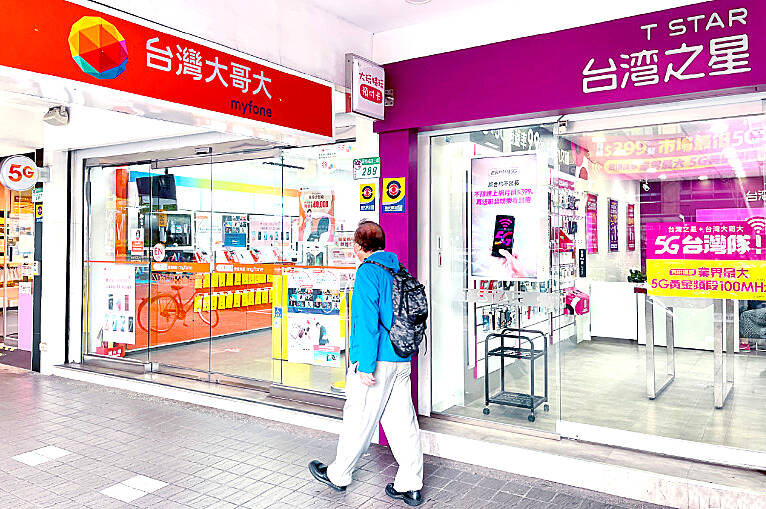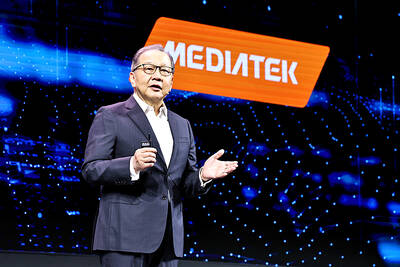Taiwan Mobile Co (台灣大哥大) yesterday said it aims to complete its acquisition of Taiwan Star Telecom Corp (台灣之星) by the end of this year, after the Fair Trade Commission gave a conditional go-ahead to the deal.
The transaction would boost the subscriber base of the new entity to nearly 10 million users along with elevated bandwidth and frequency, Taiwan Mobile said in a statement.
Taiwan Mobile’s board of directors in August approved a proposal to raise its capital spending this year to NT$15.65 billion (US$487.16 million) to fund the integration of base stations managed by the two firms.

Photo: George Tsorng, Taipei Times
Taiwan Mobile currently operates 13,000 base stations, while Taiwan Star owns 9,000 units, the companies’ data showed.
“With the regulatory approval, Taiwan’s telecom industry is ushering in a new era,” Taiwan Mobile said. “The new Taiwan Mobile will offer services with greatly elevated bandwidth and frequency for subscribers.”
In July, Far EasTone Telecommunications Co (遠傳電信) obtained an approval from the commission to absorb smaller peer Asia Pacific Telecom Co (亞太電信) in a deal valued at about NT$24.7 billion.
The number of telecom operators in Taiwan would be reduced to three from five following the latest industry consolidation.
“The telecom industry is both technology and capital-intensive. Telecom operators will be able to enhance their operational efficiency and competitiveness through mergers,” the commission said in a statement yesterday.
To maintain market competition and ease concern about market concentration, the commission demanded that Taiwan Mobile safeguard the interests of subscribers and ensure the service quality.
Taiwan Mobile must comprehensively accept terms of Taiwan Star’s existing contracts and ensure Taiwan Star’s subscribers to continue services until Dec. 31, 2025, the commission said.
In addition, Taiwan Star’s 4G subscribers are to continue their contracts until the expiration of the company’s 4G bandwidth license, it said.
Meanwhile, service subscribers who are mentally or physically challenged, from low-income households or 65 years or older can subscribe to preferential tariff plans for at least five years, the commission said. General subscribers can access preferential tariff plans for at least one year, it said.

Japanese Prime Minister Sanae Takaichi has talked up the benefits of a weaker yen in a campaign speech, adopting a tone at odds with her finance ministry, which has refused to rule out any options to counter excessive foreign exchange volatility. Takaichi later softened her stance, saying she did not have a preference for the yen’s direction. “People say the weak yen is bad right now, but for export industries, it’s a major opportunity,” Takaichi said on Saturday at a rally for Liberal Democratic Party candidate Daishiro Yamagiwa in Kanagawa Prefecture ahead of a snap election on Sunday. “Whether it’s selling food or

CONCERNS: Tech companies investing in AI businesses that purchase their products have raised questions among investors that they are artificially propping up demand Nvidia Corp chief executive officer Jensen Huang (黃仁勳) on Saturday said that the company would be participating in OpenAI’s latest funding round, describing it as potentially “the largest investment we’ve ever made.” “We will invest a great deal of money,” Huang told reporters while visiting Taipei. “I believe in OpenAI. The work that they do is incredible. They’re one of the most consequential companies of our time.” Huang did not say exactly how much Nvidia might contribute, but described the investment as “huge.” “Let Sam announce how much he’s going to raise — it’s for him to decide,” Huang said, referring to OpenAI

CHIP HANG-UP: Surging memorychip prices would deal a blow to smartphone sales this year, potentially hindering one of MediaTek’s biggest sources of revenue MediaTek Inc (聯發科), the world’s biggest smartphone chip designer, yesterday said its new artificial intelligence (AI) chips used in data centers are to account for 20 percent of its total revenue next year, as cloud service providers race to deploy AI infrastructure to meet voracious demand. MediaTek is believed to be developing tensor processing units for Google, which are used in AI applications. While it did not confirm such reports, MediaTek said its new application-specific IC (ASIC) business would be a new growth engine for the company. It again hiked its forecast for the addressable ASIC market to US$70 billion by 2028, compared

SIGNS OF STABILITY: With US tariff risks to GDP subsiding, reliable economic conditions are expected to reinforce the bank operating environment, Fitch said Fitch Ratings has upgraded the outlook for Taiwan’s banking sector to “neutral” from “deteriorating,” citing a tariff agreement with the US that has reduced uncertainty in Taiwan’s macroeconomic environment and stabilized financial performance. The US on Jan. 15 agreed to lower tariffs on Taiwanese goods from 20 percent to 15 percent, without stacking them on existing most-favored-nation rates, placing Taiwan on equal footing with major competitors such as Japan, South Korea and the EU. The deal also grants Taiwan-made semiconductors and related products most-favorable-nation treatment under Section 232 of the US Trade Expansion Act. Under the agreement, Taiwanese semiconductor, electronics manufacturing service, artificial